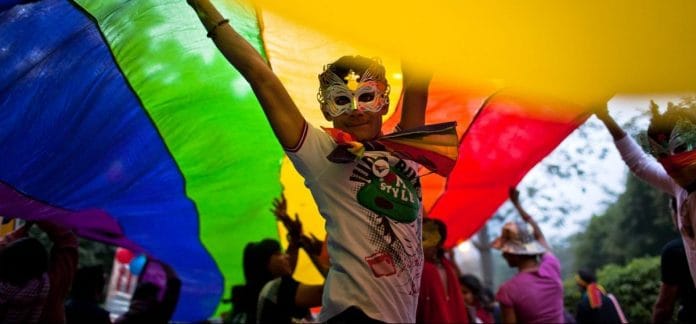India Foundation has reached consensus not to support any campaign against homosexuality – a position that is different from that of the Sangh Parivar.
New Delhi: A meeting that involved senior RSS and BJP leaders has agreed to treat sexual preference as a private matter and not to support any protests against homosexuality, at a time when the Supreme Court is considering whether to decriminalise gay sex or not.
The ‘Young Thinkers Meet’ was held Saturday in the Himachal Pradesh town of Kasauli. It was organised by the India Foundation, a New Delhi-based think tank known to be friendly with the RSS and the BJP.
The meeting was chaired by the foundation’s director and BJP general secretary Ram Madhav and RSS sah sarkaryavah (joint general secretary) Krishna Gopal.
The fact that this topic was discussed at such a conclave is being viewed as significant, since the RSS is thought to be against homosexuality.
The BJP government of Narendra Modi also did not take a position on decriminalising homosexuality and left it to the wisdom of the apex court to decide on the issue.
“It was a planned and scheduled discussion under ‘group activity’. The sentiments of the youth were heard and agreed upon. They also debated criminalisation of homosexuality,” said a source who attended the meet.
A senior RSS functionary told the participants that “there are many other issues that need the attention of youth and others in the country; let us focus on those”, indicating that the RSS now wants homosexuality to be treated as a private matter.
Participants’ views
Hansa, a young marine law expert from Hyderabad who attended the meeting, said: “Section 377 has to be read down as it is against basic structure of the Indian Constitution. It also violates the entrenched spiritual principles in India.”
Swadesh Singh, an assistant professor in Delhi University and another participant, said that agitations against homosexuals need to be curbed. “We need to sit back and read up our past. Homosexuality was very much part of our history. What we need to do is criticise the present Indian social system that criminalises the personal sexual choices of a person,” he said.
Akshat, an entrepreneur based in Delhi and a graduate from Kellogg School of Management in the US, also supported the notion that sexual preference was a private matter. “Section 377 should be read down to include only offenses against animals and children. Adults should be free to choose their sexual orientation, but they should also be sensitive to the sensibilities of others around them,” he said.
Other topics debated and discussed at the conclave were Kashmir, national security, ‘one-nation one-election’, and West Bengal.
Section 377 on borrowed time?
The Supreme Court has reserved its judgment on reading down Section 377, but its observations in the course of the hearing indicated that the archaic law is on borrowed time, experts have said.
The SC’s famed privacy judgment of August 2017 made it quite clear that sexual preference is a part of a person’s right to privacy. The case for decriminalising homosexuality was reopened at the behest of the court itself, as Chief Justice Dipak Misra said in early 2018 that one section of society could not live in fear.
In 2013, the SC itself had reversed a 2009 Delhi High Court judgment that decriminalised consensual sex among adult homosexuals. However, the criminality clause remained in cases where non-consensual penile, non-vaginal sex and sexual acts by adults with minors were concerned.







Praiseworthy. The organisation should both mould and reflect changing social mores, continue to evolve.